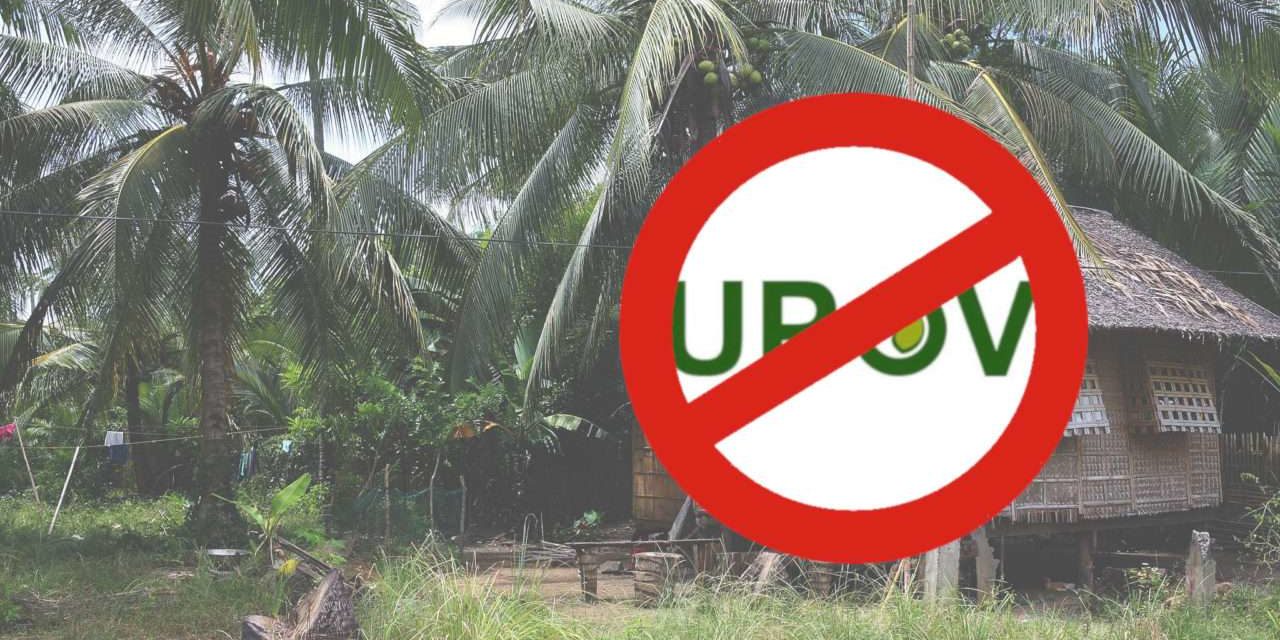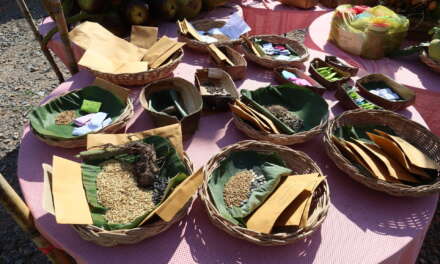RCEP Negotiations Must Not Include Obligation to Join or Implement UPOV Systems and In Anyway Undermine Farmers’ Rights
[Full text of Philippine civil society letter on RCEP and plant variety protection]
The undersigned signatories are writing to strongly stress that the Regional Comprehensive Economic Partnership (RCEP) negotiations must not place any obligation on the Philippines or any other developing country to join or implement UPOV systems or impose any other obligation and/or limitation in relation to plant variety protection. Nothing in the RCEP negotiations must affect the Farmers’ Rights, especially their freedom to operate with respect to farm saved seed/propagating material.
Also see “Asian NGOs Raise Concern Over IP And Seeds In RCEP Trade Deal” to read similar positions raised by groups in india and Malaysia.
Agriculture is of crucial importance to our economy, employing an estimated 12 million people or about 33% of the country’s labor force. It accounts for 10-20% of the GDP. Most of our farms are family farms, with 89% of them having a land holding of less than 3 hectares. 39% of these farmers have an average land holding of 0.5 hectares. The farmer-managed system is the main supplier of seeds. Hence it is in our national interest to support policies and laws that recognise the traditional right of small farmers to save, use, exchange, share or sell their farm produce of a variety protected for reproduction and replanting in their own land.
Our country is also a party to the International Treaty on Plant Genetic Resources for Food and Agriculture (ITPGRFA), the Convention on Biological Diversity (CBD), the Nagoya Protocol on Access and Benefit Sharing. More recently our country supported adoption of the UN Declaration on Peasants’ Rights.
The UPOV system is simply unsuitable for our country and its people. The process of crafting a national law, the Plant Variety Protection Act of 2002 has not been insulated from pressures to comply with the UPOV system. Such is the power and influence of UPOV.
The UPOV system lacks policy space for our government to implement measures to reflect national realities, protect public interests and farmer seeds systems. In fact, the UPOV system conflicts with requirements of Article 6 and 9 of the ITPGRFA. i Article 6 requires Contracting Parties to develop and maintain appropriate policy and legal measures that promote the sustainable use of plant genetic resources for food and agriculture including supporting the development and maintenance of diverse farming systems, promote participatory plant breeding, strengthen the capacity to develop varieties adapted to social, economic and ecological conditions, broaden the genetic base of crops etc.
Article 9 of the ITPGRFA states it is government’s responsibility to take measures to “protect and promote” Farmers’ Rights including farmers’ right to save, use, exchange and sell farm saved seeds, their right to the protection of traditional knowledge and to equitably participate in sharing benefits arising from the utilization of plant genetic resources for food and agriculture.
A recent study undertaken on behalf of the German Federal Ministry for Economic Cooperation and Development concluded that “UPOV 91-based PVP laws were found to not advance the realization of Farmers’ Rights; rather they are effective in the opposite direction”.
A human rights impact assessment of the 1991 Act of UPOV implementation in the Philippines concluded “…if implemented and enforced, UPOV 91 would sever the beneficial inter-linkages between the formal and informal seed systems”, and its “restrictions on the use, exchange and sale of protected seeds could adversely affect the right to food, as seeds might become either more costly or harder to access” as well as “other human rights, by reducing the amount of household income which is available for food, healthcare or education.” It is estimated that joining or complying with UPOV 91 will increase the cost of seeds by more than 4 times.
The assessment further adds that traditional knowledge applied by farmers in the selection, preservation and storing of seed is the basis of local innovation and in situ seed conservation and “UPOV’s restrictions on saving, exchanging and selling protected seed comes at the expense of farmers gradually losing their know-how related to seed selection and preservation. They would also gradually lose their ability to make informed decisions about what to grow and on which type of land, how to respond to pest infestation, or how to adapt their seed system to changing climatic conditions.” “The process of “deskilling” of farmers – which is already underway with the decline of local agrobiodiversity – could become more acute with restrictions on use of seeds introduced through UPOV 91-style laws, and that from a human rights perspective, restrictions on traditional practices and seed management systems … adversely impact on farmers’ rights, cultural rights, minority rights, indigenous peoples’ rights, women’s rights, as well as on biodiversity and the right to food”.
According to the General Comment 12 of the Committee on Economic, Social and Cultural Rights, the right to food requires States to pro-actively engage in activities intended to strengthen people’s access to and utilization of resources [includes seeds] and means to ensure their livelihoods including not taking any measures that result in preventing such access. v Therefore, intellectual property regimes and seed policies must be compatible with and conducive to the realization of the right to adequate food.
The former Special Rapporteur on the Right to Food in its 2009 report to the UN General Assembly highlights that
“States – particularly developing countries where the function of traditional, farmers’ seed systems is even more important both for the prevention of genetic erosion and for the livelihoods of farming communities – should design sui generis forms of protection of plant varieties which allow these systems to flourish, even if this means adopting non-UPOV compliant legislations”.
He concludes:
“No State should be forced to establish a regime for the protection of intellectual property rights which goes beyond the minimum requirements of the TRIPS Agreement: free trade agreements obliging countries to join the 1991 UPOV Convention or to adopt UPOV-compliant legislation, therefore, are questionable.”
A major concern with the UPOV system is that facilitates bio-piracy of genetic resources. It does not recognize the principles of the CBD that access to local genetic resources should be subject to prior informed consent (PIC) and fair and equitable benefit sharing (BS). Instead it allows PVP protection for varieties developed by misappropriating local genetic resources. Hence, UPOV conflicts with CBD and efforts in the international fora such as the WTO and WIPO, whereby Philippines and other developing countries have advocated for the right to require applicants to disclose origin, proof of PIC and benefit sharing as a condition for receiving intellectual property (IP) protection.
In short, UPOV system offers an extremely rigid and inappropriate legal framework for developing countries. It was developed in the 60s’ for seed production modalities prevailing in developed countries especially in Europe. Philippines and other developing countries never participated in UPOV negotiations. Hence, unsurprisingly multiple independent experts recommend that developing countries should not join UPOV. [See: list of documents underlining this recommendation at the end of this post.]
Among the 16 RCEP countries, only five countries (Australia, Japan, Republic of Korea, Singapore and Vietnam) are parties to UPOV 1991. China and New Zealand are members of the UPOV but have not signed on to the 1991 Act of UPOV, while the remaining 9 countries (Brunei, Cambodia, India, Indonesia, Laos, Malaysia, Myanmar, the Philippines, and Thailand) are not even members of UPOV.
We are extremely concerned that countries that are not a party to UPOV are being made to ratify or accede to UPOV 1991 and/or comply with UPOV 1991 standards and alarmingly will be asked to amend their national PVP laws and to delete provisions that safeguard farmers’ rights and public interests. In the case of the Philippines for example, the Department of Agriculture sought from UPOV Council an examination of conformity to UPOV 1991 of the country’s Plant Variety Protection Act of 2002. The Council was then asked to “advise the Government of the Philippines that the Law incorporates the majority of the provisions of the 1991 Act, but still needs some clarifications and amendments, in order to fully conform with the 1991 Act”. Provisions in the national law on local registries by communities and the creation of National Gene Trust Fund as well as the right of small farmers to save, use, exchange, share or sell their farm produce of a variety protected under the 2002 Act, which were vigorously pushed by civil society will be threatened by the move towards full compliance.
The Philippine experience and those of other countries that are being made to amend their national laws, show the tremendous influence international standard setting conventions like UPOV have on domestic policies, with far reaching implications on how a country can pursue development of its agriculture sector and secure the livelihoods of its farmers and food producers.
We should not allow international trade agreements like RCEP dictate and set the standards for plant variety protection especially in the context of current push for revisions of the Seed Industry Act that will further entrench private control on seeds, as part of the move towards standardisation of seed laws in the region.
Our PVP law can be fixed in the future to remove its UPOV91-type provisions, but it can’t be fixed if our country is forced to comply with or join UPOV91 because of RCEP.
Finally, we applaud our Government’s support for the “Declaration on the right of peasants and other people working in rural areas” adopted by the Human Rights Council and the UN General Assembly which requires States to “take measures to respect, protect and fulfil the right to seeds of peasants and other people working in rural areas”, which include Farmers’ Rights. Implementation of the Declaration requires our country to have and maintain full policy space to put in place relevant measures.
We stress that the UPOV system would be inconsistent with and undermine the farmer seed systems of our people and the international rights and obligations of our country under the various international instruments. Most importantly, nothing must affect the right of our farmers to freely save, use, exchange and sell farm saved seeds/propagating material.
We recall that Article 27.3(b) of the WTO-TRIPS Agreement allows countries complete freedom to adopt a PVP system suitable to its agricultural condition and needs. Nothing in the RCEP negotiations should affect and limit this freedom. The Philippines must have full policy space to implement a PVP system that is appropriate for its agricultural system, protects its local plant genetic resources, its farmers and safeguard public interest as well as enable it to take measures to implement the Declaration on the Right of Peasants and other people working in rural areas. ###
SIGNATORIES
KATARUNGAN (Kilusan para sa Repormang Agraryo at Katarungang Panlipunan)
PAKISAMA – Pambansang Kilusan ng mga Samahang Magsasaka (National Federation of Family
Farmers Organizations)
Third World Network
Focus on the Global South
WomanHealth Philippines
DIGNIDAD Coalition
Lilak (Purple Action for Indigenous Women’s Rights)
ETC Group-Philippines (Action Group on Erosion, Technology and Concentration).
Trade Justice Pilipinas
Sentro ng mga Nagkakaisa at Progresibong Manggagawa (SENTRO)
Labor Education and Research Network (LEARN)
Initiatives for Dialogue and Empowement through Alternative Legal Services (IDEALS)
Download a PDF version of this letter here.
“The UPOV Convention, Farmers’ Rights and Human Rights – An integrated assessment of potentially conflicting legal frameworks” published by Deutsche Gesellschaft für Internationale Zusammenarbeit (GIZ) on behalf of the German Federal Ministry for Economic Cooperation and Development” (June 2015)
UNDP (2008) “Towards a Balanced Sui Generis Plant Variety Regime”
“Owning Seeds, Accessing Food – A human rights impact assessment of UPOV 1991 based on case studies in Kenya, Peru and the Philippines,” October 2014
Carlos M. Correa et al. (2015), “Plant Variety Protection in Developing Countries: A Tool for Designing a Sui Generis Plant VarietyProtection System: An Alternative to UPOV 1991” in APBREBES
[Photo credit: Wikimedia commons]










